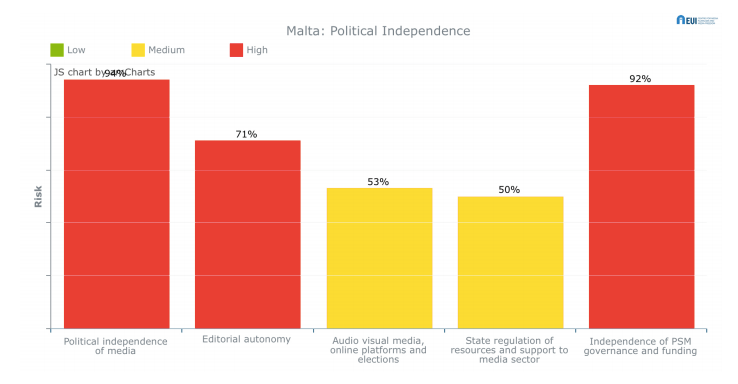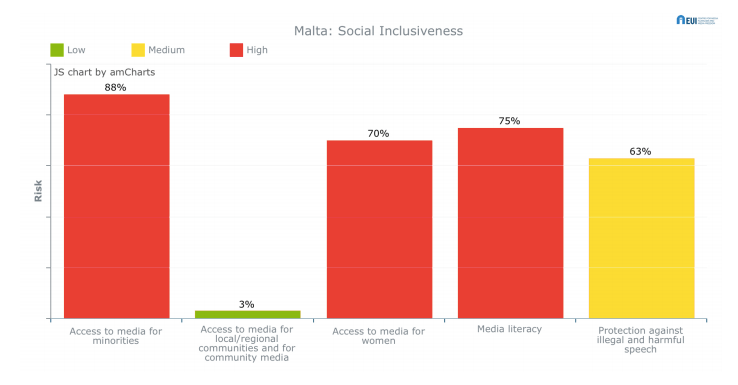The Shift’s efforts to ensure financial transparency by disclosing its sources of revenue have been noted in the 2021 country report by the Centre for Media Pluralism and Media Freedom (CMPF), prepared by the European University Institute, which continues to monitor and assess the challenges faced by Malta’s journalists.
The latest Media Pluralism Monitor report describes how, although the data collected indicates an overall medium risk to media pluralism in Malta, there are several pressing individual indicators that are still classified as high risk and which remain unaddressed. These include the transparency of media ownership, the independence of the public service media governance and funding, access to media for women and minorities, and no efforts to address media literacy.
The report also draws attention to the challenges the media faced because of the COVID-19 pandemic. Not only did media outlets suffer a reduction in economic activity but when the Maltese government stepped in to provide subsidies, it did so in such a way that it was ultimately party-owned media houses that appeared to benefit the most. Additionally, the government’s lack of transparency surrounding the distribution of COVID-19 subsidies became a major issue as highlighted by The Shift’s analysis to the International Press Institute (IPI).
The highest risk scores for Malta remain those of political independence (94% risk level) in connection with political party-owned media, as well as concerns over the lack of independence in public service media governance, funding and editorial independence.

The political independence of media in Malta showing high risk individual indicators.
Some of the issues highlighted in the report include the business relationship between ex-prime minister Joseph Muscat’s chief of staff, Keith Schembri, and the former Times of Malta Managing Director, Adrian Hillman, involved in alleged money laundering and kickbacks, the appointment of a Labour Party sympathiser as the public service media’s editor-in-chief and the consistent under-reporting by the State broadcaster of the major scandals following an analysis that was carried out by The Shift.
The risk related to the independence of public service media governance and funding indicator increased by nine percentage points (83% in 2020 to 92% in 2021) and the report states that this change in risk assessment is due to a recent development that impacts the transparency of public service media funding when, in September 2020, the Shift reported that €30 million would be allocated to Public Broadcasting Service (PBS) from public funds, spread over the next five years despite the company suffering heavy losses.
The lack of data about the market share of individual news outlets, advertising revenues, and audience concentration means that market plurality in Malta is also classified as “high risk” because there is no way to properly monitor and assess the individual indicators such as news media concentration, online platforms concentration, and competition enforcement and the media viability.
The report further notes how both political party-owned media houses have not published their accounts in over 10 years, even if they have a legal obligation to do so annually under the Companies Act.

Social inclusiveness in the media in Malta showing high risk indicators.
The area of social inclusiveness scored an overall medium risk score (60%) but three of the five individual indicators within this category are considered high risk. These are: access to media for minorities (88%), access to media for women (70%) and media literacy (75%).
The report describes how women are still under-represented in different areas in the media and the lack of women’s participation in current affairs and news programmes remains problematic.
Although there has been a slight improvement in appointing women to the board of directors in the public service media sector, all the other private broadcasters have no women on their boards, with the exception of one woman (out of five members) on the One Group board of directors. And while PBS appointed a woman as editor-in-chief, there remain very few women at the helm of a newsroom with the exception of The Shift’s founder and managing editor, Caroline Muscat.
The report further highlights how there are no legally recognised minorities in Malta and consequently, no specific provisions relating to access to airtime for underrepresented groups which “is detrimental to any progress being made with regards to effective integration”.
It was the media literacy indicator that saw the biggest jump from medium risk to high risk by 23 percentage points (52% in 2020 to 75% in 2021). This jump in score was not only because the country does not have an official media literacy policy and neither is it an intrinsic part of the curriculum but also because there are practically no independent initiatives that address this urgent issue and “considering Malta’s particular media landscape, it is an area that needs urgent attention and focus”.
When addressing the protection of freedom of expression in Malta, the study also describes how the assassination of journalist Daphne Caruana Galizia is still very much part of the country’s psyche and that its chilling effect on Malta’s media landscape can still be felt.
“Nevertheless,” the report goes on to state, “in the wake of this singular event, Malta has also seen the emergence of a positively persistent and brave cohort of journalists and political commentators, many of whom have been instrumental in keeping Caruana Galizia’s stories alive.”
The country report for the Media Pluralism Monitor study was compiled and written by Louiselle Vassallo from the University of Malta and reviewed by a group of national experts in the field in order to ensure that the results were accurate and reliable.
The full report can be found here.












